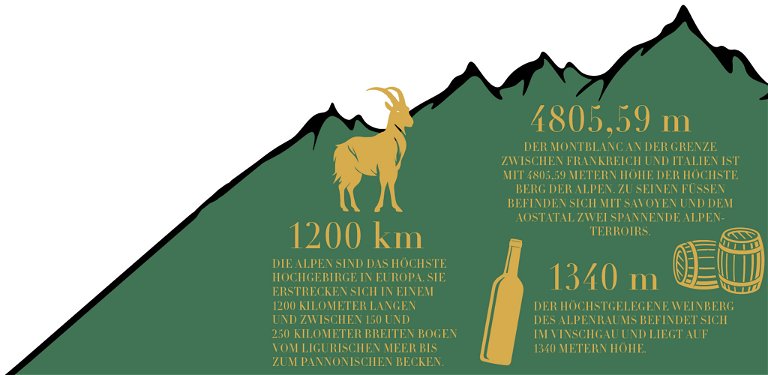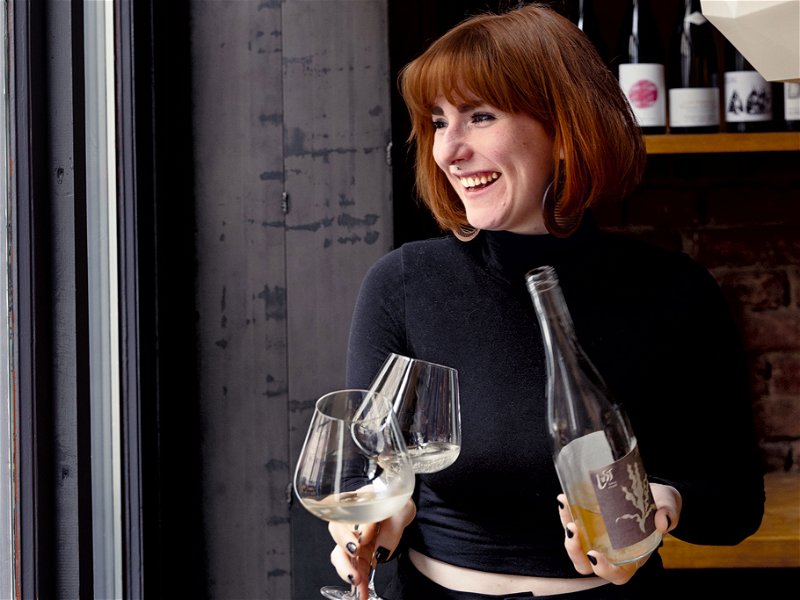Alpine wine myth: the nine best wines from lofty heights
Our Alps have always been a mysterious place. No wonder, the region is not only fertile ground for all kinds of myths and legends, but also one of the most exciting and diverse terroirs in the world. What's more, Alpine winegrowers are among the winners of our time, as there is hardly any lack of freshness at lofty heights.
Around 130 million years ago, the African continental plate began to drift northwards and push against the Eurasian plate. During this momentous collision, the two plates interlocked in such a way that kilometer-thick layers of rock were folded, compressed and pushed on top of each other. A process that progressed over millions of years and reached its peak around 30 million years ago, when the rock masses were pushed upwards from the south and formed a gigantic folded mountain range in the heart of Europe: the Alps.
The highest mountain range in Central Europe stretches over 1,200 kilometers in an arc from southern France to the Pannonian Basin. When you think of the Alps, you think of majestic peaks, icy glaciers, rugged rock faces and lush alpine meadows. Mountain sports and winter tourism, cheese perhaps, but rarely the wines that are produced in the Alpine regions. Still – because in the wake of climate change and rising temperatures, wines from high altitudes are increasingly becoming the focus of desire.
And there are good reasons for this: While it is getting hotter and hotter in the lowlands and the wines produced there are getting heavier and more alcoholic, the higher altitudes are cooler and the wines from there are more elegant and full of finesse. Wherever possible, the top winegrowers of Europe's classic wine regions are therefore drawn to the heights. This is often a difficult undertaking, because in many places you simply can't go any higher. So lucky if you are a winegrower in the Alps.

The Alpine region covers a total of eight countries, namely Austria, France, Germany, Italy, Liechtenstein, Monaco, Slovenia and Switzerland. However, not all of these countries have significant wine regions that are directly influenced by the Alps. The risk of frost and limited sunlight for growth, photosynthesis and ripening of the grapes made viticulture in the alpine regions particularly challenging for a long time. The acidity of the grapes was high and the efforts of the winegrowers were less focused on quality than on quantity, which meant that many Alpine wines were long perceived as simple, rustic wines. Wines that were uncorked less for pleasure than for lack of alternatives in the local tourist areas.
However, a lot has changed in this respect over the last 30 years. Climate change has led to grapes ripening faster and, in combination with the know-how of producers, quality has risen almost by leaps and bounds in many growing regions. There are more and more wineries in the Alpine regions that focus on the Alpine terroir and bottle unique, handcrafted, delicate wines that are in tune with the times thanks to precisely these characteristics and are now in great demand among sommeliers and wine merchants worldwide. What's more, the often autochthonous grape varieties, which are adapted to the special growing conditions of the Alps, still make real discoveries possible.
The best high-altitude wines
Over the next few weeks, we will be taking you to the alpine wine-growing worlds of Switzerland, Italy, France, Germany and Austria.
Don't miss out!
Sign up now for our newsletter.




















